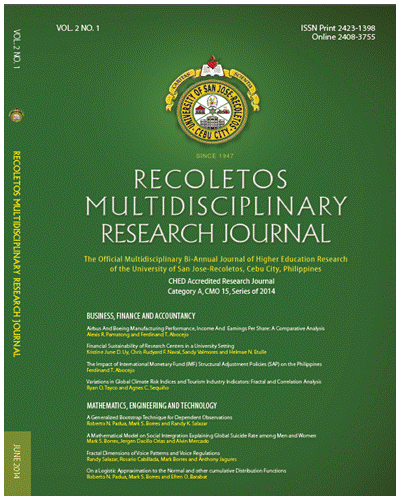The Anglo-American Elements in Jose Rizal’s Poem Education Gives Luster to the Motherland
DOI:
https://doi.org/10.32871/rmrj1402.01.22Keywords:
Anglo-American Literary Studies, Jose Rizal, Jose Rizal’s poemAbstract
There is no known study made about the Anglo-American ideas found in Jose
Rizal’s poems. Hence, this study looks into Rizal’s poem Education gives luster to the motherland and identify the Anglo-American ideas that are found in it. The study assumed that since England and the United States are politically and economically powerful, they have great influence to states that are less powerful like the Philippines. The study found out through descriptive textual analysis that Rizal’s poem is romanticist in character. Since romanticism originated in England, his poem contains English ideas and he is influenced
by English thought. Rizal is a proponent of education as shown by the poem. His advocacy for education as a means by which the nation can develop is shared by the Americans because education is one of the major contributions and legacy of America to Philippine history. Rizal’s desire to liberate his countrymen from ignorance which in turn will liberate the people from oppression is parallel to America’s advocacy for liberation, freedom and democracy. Therefore, Rizal’s poem contains American ideas and he is influenced by American thought. This study recommends that another analysis must be made to see if Rizal’s other poems contain Anglo-American ideas.
References
Landmarks of Literature,. English department, Brooklyn college. Retrieved from a
Baldick, Chris (2001). Oxford concise dictionary of Literary terms. New York: Oxford University Press.
Bonn, Julien D (2004). Comprehensive Dictionary of Literature. Delhi: Abhishek.
Cuddon, J.A. & M.A.R. Habib (2013). A Dictionary of Literary Terms and Literary Theory. Chichester, UK: Willey-Blackwell.
Craig, A. Lineage, Life and Labors of Jose Rizal, Philippine Patriot. Indy Publish.com, 2003. Retrieved from Google Scholar.
Coates, A. Rizal Philippine Nationalist and Martyr. New York: Oxford University Press, 1968.
Drabble M. (2000). The Oxford Companion to English Literature Sixth Edition. New York: Oxford University Press.
King, N. & King, S. (2002). Dictionary of Literature in English. London: Fitzroy, Dearborn Publiushing.
Merriam –Webster’s Encyclopedia of Literature (1995), Springfield, Massachusetts.
Mehta , Uday Singh (1999). Liberalism and Empire: A Study in Nineteenth Century British Liberal Thoughts. University of Chicago Press.
Morener Kathleen and Ralph Rausch (1997). NTC’s Dictionary of Literary terms. Chicago: NTC Publishing Group. Retrieved from <www.uh.edu/
engines/romanticism/ Introduction.html> on March 10, 2014.
Ocampo, A. R. (2001). Meaning and History: The RizalLectures. Manila: Anvil.
Zaide, G. F. & Zaide, S. M. (2008). Jose-Rizal: Life, Works and Writings of a Genius, Writer, Scientist and National Hero.
Zaide, S. (1994). The Philippines: A unique Nation. Quezon City: All Nations Publishing Co., Inc.
Downloads
Published
How to Cite
Issue
Section
License
Copyright of the Journal belongs to the University of San Jose-Recoletos


